- Home
- Anne McCaffrey
Dragonseye Page 9
Dragonseye Read online
Page 9
“They repeat the process six or seven times a day the first month,” he’d warned her. “You’ll end up thinking you’ve spent all your life chopping gobbets until she settles to the usual three meals a day. But don’t worry. By the end of her first year she’ll be eating only twice a week—and catch her own at that.”
Debera smiled, remembering that conversation and thinking that T’dam had no idea what a relief it would be to have such an easy job, the doing of which would be a labor of love and so gratefully received. She held her hand over her beloved Morath, wanting to caress this so-beloved creature but not wishing to disturb her—especially when Debera was all but asleep herself. She lingered, though, despite weariness, just watching Morath’s ribs rise and fall in sleeping rhythm. Then she could no longer resist fatigue.
She was the lone human in the weyrling barn . . . no, barracks. Well, the others had their families to celebrate with. Who’d’ve thought that Debera of Balan Hold would be sleeping with dragons this night? She certainly hadn’t. She slipped out of the fine dress now, smoothing the soft fabric of the green gown one last time as she folded it. It had felt so good on her body and was such a becoming color: quite the loveliest thing she had ever worn. Gisa had got all her mother’s dresses, which ought by custom to have come to her. Debera shrugged into the nightgown, aware of the subtle bouquet of the herbs in which it had been stored. She’d once had time to gather the fragrant flowers and leaves for sachets with her mother.
She pulled back the thick woolen blanket, fingering its softness, and not regretting in the slightest the over-washed and thin ones she had shared with her stepsisters. The pillow was thick under her cheek, too, as she put her head down, and soft and redolent of yet more fragrances. That was all she had time to think.
Back at the College, Sheledon, Bethany, and Sydra arrived a-dragonback, full of the ardent reception they’d had at Telgar Weyr.
“I don’t know why we didn’t think of Teaching Ballads before now,” Sydra said, slightly hoarse from all the singing she’d done the night before.
“Too bad we hadn’t the selections ready for the other two Impressions,” Sheledon said, for he invariably saw disadvantages everywhere. “Are there any more upcoming?”
“Well, there’re Year’s End celebrations . . .” Bethany said.
“We tend to stay here for them,” Sheledon replied, not wanting to miss the feasts that Chrislee generally provided for those holidays. The senior teachers at the College invariably were included on the Fort guest list and never missed such opportunities, even if they had the option of returning to their native hearths for the three-day celebration.
“Maybe this once,” Sydra began, looking at Sheledon, “we should go home and spread the word.”
Bethany frowned. “The full chorus and accompaniment is what makes the songs so effective . . .”
Sheledon frowned. “We can certainly organize substantial groups for the main Holds. The dragonriders always come as guests anyway, so they’d all get a chance to hear . . .” Then he smiled down at his wife, settling an affectionate arm across her shoulders. “You sure did the boy soprano bit well. But I think we’d best get the juvenile voice for Year’s End. You’re hoarse today.”
“Halllooo down there,” and they all looked up to see Clisser, bending far out an upper window and waving at them. “Did the ballads work?” he yelled, hands to his mouth.
The musicians looked at each other, Sheledon counted the beat, and they roared back, “THEY LOVED US!”
Clisser made a broad okay gesture with both hands and then waved them to go to his office in the original section of the facility.
They reached it first, still elated with the success of their performance, an elation that began to disperse when they saw Clisser’s expression.
“What’s the matter?” Bethany asked, half rising from her chair.
“The computers went down and Jemmy thinks they’re totally banjaxed now,” Clisser said glumly, flopping into the chair at his desk, his body slack in despair.
“What happened? They were working perfectly,” Sheledon said, scowling. “What was Jemmy—”
Clisser held up one hand. “Not Jemmy . . .”
“One of those students hacking around . . .” Sheledon’s expression suggested dire punishments.
Clisser shook his head. “Lightning . . .”
“Lightning? But we had no storm warnings . . .”
“Fried all the solar panels, too, although, at least we can replace those. Corey lost her system, what was left of it, including the diagnostics she’s been trying so desperately to transcribe.”
Made speechless by such a catastrophe, Sheledon sat down heavily on the corner of the desk while Sydra leaned disconsolately against the wall.
“How much is gone?” Bethany asked, trying to absorb the disaster.
“All of it,” and Clisser flicked his fingers before he clasped them together across his chest, chin down.
“But . . . but, surely, it’s only a matter—” Sheledon began.
“The motherboards are charcoal and glue,” Clisser said dully. “Jemmy’s gone through every box of chips we had left, and there aren’t enough to rebuild even a few meg, and that wouldn’t operate the system. Even part of the system. It’s gone,” and he waved his hand helplessly again.
There was silence for long moments as those in the room coped with such a massive loss.
“How much did the students—” Bethany began, cutting her sentence off as Clisser waved, almost irritably, to silence her. “Surely they saved something.”
“Something, but nowhere near what we need, what was waiting to be copied, a mere fraction of what we need to know . . .”
“Look, Clisser,” Bethany said gently, “what have we really lost?”
He jerked his head up, glaring at her. “What have we really lost? Why, everything!”
Sheledon and Sydra were regarding Bethany as if she had run mad.
“The history we are already seeing as irrelevant to our lives now?” she asked softly. “Descriptions of archaic devices and procedures that have no relevance on Pern since we no longer operate an advanced technological society? Isn’t that what you were doing anyway, Clisser? Changing the direction of teaching in line to what is needed in this time, on this planet, and disregarding I don’t know how many gigabytes of stored information that is irrelevant! Now that we don’t have to worry about all that,” and her hand airily dismissed the loss, “we can forge ahead and not have to concern ourselves with translating useless trivia for posterity. So I ask you, what have we really lost?”
Silence extended until Sheledon uttered a sharp laugh. “You know, she may be right. We’ve been knocking ourselves out copying down stuff that won’t work here on Pern anyhow. Especially,” and his voice hardened, “since no one back on Earth cares enough to find out what’s happened to us.”
Sydra regarded her husband with a blink. “Not that old Tubberman homing tube business again?”
Sheledon went defensive. “Well, we know from—”
“The records,” Sydra said with a malicious grin, and Sheledon flushed, “that the message tube was sent without Admiral Benden’s authority. Without the name of a colony leader on it, no one on Earth would have paid it any heed. If it even got to Earth in the first place.”
“Someone could have come and had a look-see,” Sheledon said.
“Oh, come now, Shel,” Bethany said, as amused by his sudden switch, for he had always derided the Tubberman Tube Theory. “Pern isn’t rich enough for anyone to bother about.”
“So the precious records said, but I think that was to save face. They should have checked on us to see how we were faring . . . They got awfully proprietary about the Shavian colonies that were the basic reason for the Nathi Space War.”
“That was over three hundred years ago, Shel,” Bethany said in her patient teacher-tone.
“And it is totally irrelevant to now,” Sydra added. “Look, the loss of the computer
s is undeniably a blow to us. But not something we cannot overcome . . .”
“But all that information!” cried Clisser, tears coming to his eyes.
“Clisser dear,” and Bethany leaned across to him, patting his hand gently, “we still have the best computers ever invented,” she tapped her forehead, “and they’re crammed full of information: more than we really need to operate.”
“But . . . but now we’ll never find out how to preserve vital information—like early warning of the return of the Red Star.”
“We’ll think of something,” she said in such a confident tone that it penetrated Clisser’s distress. And briefly he looked a trifle brighter.
Then he slumped down in even deeper despair. “But we’ve failed the trust placed in us to keep the data available . . .”
“Nonsense!” Sheledon said vehemently, crashing one fist down on the desktop. “We’ve kept them going past their design optimum. I’ve read enough in the old manuals to appreciate that. Every year for the past fifty has been a miracle. And we haven’t, as Bethany says, lost all. A gimmick from the past has failed, like so many of them have. And we’re now going to have to bypass the easy access to data they provided and sweat through books! Books! Books that we have in quantity.”
Clisser blinked. He shook his head as if mentally rejecting a thought.
“We have been planning to ignore much of the old data,” Bethany said gently. “What was most important to us,” and her hand indicated the Pern of the present, “has been copied . . . well, most of it,” she amended when Clisser opened his mouth. “If we haven’t needed it up to now, we never will.”
“But we’ve lost the sum total of human—” Clisser began.
“Ha!” Sydra said. “Ancient history, man. We’ve survived on Pern and it is Pern that’s important. As Bethany said, if we haven’t needed it up till now, we never will. So calm down.”
Clisser scrubbed at his skull with both hands. “But how will I tell Paulin?”
“Didn’t the lightning affect Fort, too?” Sheledon asked, and answered himself: “I thought I saw a work-force on the solar heights.”
Clisser threw both hands up in the air. “I told him we were checking the damage . . .
“Which is total?” Sheledon asked.
“Total!” and Clisser dropped his head once again to his chest in resignation to the inevitable.
“It’s not as if you caused the storm, or anything, Cliss,” Bethany said.
He gave her a burning look.
“Was the system being run at the time?” Sheledon asked.
“Of course not,” Clisser said emphatically, scowling at Sheledon. “You know the rule. All electronics are turned off in any storm.”
“And they were?”
“Of course they were.”
Bethany exchanged a look with Sheledon as if they did not credit that assurance. They both knew that Jemmy would work until he fell asleep over the keyboard.
“I tell you,” and Clisser went on, “everything powered went down. It’s just luck that the generators have all those surge protectors, but even those didn’t save the computers. The surge came in on the data bus, not the power lines.”
“The computers were dying anyway. They are now dead, really truly dead,” Sheledon said firmly. “Rest in peace. I’ll go tell Paulin if he’s who you’re worried about.”
“I am not,” and Clisser banged his fist on the table, “worried about Paulin. And it’s my duty to tell him.”
“Then also tell him that our new teaching techniques are in place and that we’ve lost nothing that future generations will need to know,” Sydra said.
“But . . . but . . . how do we know what they might need to know?” Clisser asked, clearly still despairing with that rhetorical question. “We don’t know the half of what we should know.”
Bethany rose and took the two steps to the beverage counter.
“It’s not working, either,” Clisser said in a sharp disgusted tone, flicking one hand at it, insult on injury.
“I shall miss the convenience,” she said.
“We all shall miss convenience,” Clisser said and exhaled sharply, once again combing his hair back from his forehead with impatient fingers.
“So,” said Sydra with a shrug of her shoulders, “we use the gas ring instead. It heats water just as hot, if not as quickly. Now, let’s all go get a reviving cup, shall we?” She took Clisser by the hand, to tug him out of his chair. “You look as if you need reviving.”
“You’re all high on last night’s success,” he said accusingly, but he got to his feet.
“As well we are,” said Sheledon. “The better to console you, old friend.”
“Clisser,” Bethany began in her soft, persuasive voice, “we have known from our reading of the Second Crossing that the artificial intelligence, the Aivas, turned itself off. We know why. Because it wisely knew that people were beginning to think it was infallible: that it contained all the answers to all of mankind’s problems. Not just its history. Mankind had begun to consider it not only an oracle, but to depend on it far more than was wise. For us. So it went down.
“We have let ourselves be guided too long by what we could read and extract from the data left to us on computer. We have been too dependent. It is high time we stood squarely on our own two feet . . .” She paused, twisting her mouth wryly, to underscore her own uneven stance. “. . . and made our own decisions. Especially when what the computers tell us has less and less relevance to our current problems.”
“You said it, Bethany,” Sheledon said, nodding approval, his mouth in a wry twist.
Clisser smoothed back his hair again and smiled ruefully. “It would have been better if this could all have happened just a little,” and he made a space between thumb and forefinger, “later. When we found what we need for the dragonriders.”
“You mean, a fail-proof system to prove the Red Star’s on a drop course?” Sheledon asked, and then shrugged.
“The best minds on the continent are working on that problem.”
“We’ll find a solution,” Bethany said, again with her oddly calm resolution. “Mankind generally does, you know.”
“That’s why we have dragons,” Sydra said. “I could really murder for a cup of klah.”
CHAPTER V
Weyrling Barracks and Bitra Hold
AN INSISTENT, INCREASINGLY urgent sense of hunger nagged Debera out of so deep a sleep she was totally disoriented. The bed was too soft, she was alone in it, and neither the sounds nor smells around her were familiar.
I really am most terribly hungry and I know that you were very tired but my stomach is empty, empty, empty...
“Morath!” Debera shot bolt upright and cracked her poll on the underside of the dragonet’s head because Morath had been leaning over her bed. “Ouch! Oh, dearest, I didn’t hurt you, did I?” Standing up in the bed, Debera wrapped apologetic arms about Morath, stroking her cheeks and ear knobs, reassuring her with murmurs of regret and promises to never hurt her again.
The little dragon refocused her eyes, whirling lightly but with only the faintest tinge of the red of pain and alarm, which dissipated quickly with such ardent reassurances.
Your head is much harder than it looks, she said, giving hers a little shake.
Debera rubbed underneath Morath’s jaw, where the contact had been made.
“I’m so sorry, dearest,” and then she heard a giggle behind her and swiveling around, half in anger, half in reflexive defense, she saw that she was not alone in the weyrling barracks. The blonde girl from Ista—Sarra, that was her name—was sitting on the edge of her bed, folding clothes into the chest. Her dragonet was still curled up in a tight mound from which a slight snore could be heard.
“Oops, no offense intended . . .” Sarra said, smiling with such good nature that Debera immediately relaxed. “You should have seen the looks on your faces. Morath’s eyes nearly crossed when you cracked her.”
Debera rubbed the top of
her head, grimacing, as she descended from the bed.
“I was so deeply asleep . . . I couldn’t think where I was at first . . .”
“Morath’s been as good as she could be,” Sarra said. “T’dam said to dress for dirty work. We’re supposed to bathe and oil them after their first nap of the day.”
That was when Debera remembered the pile of things she had not properly sorted the previous night.
Does dressing take long? Morath asked plaintively.
“No, it doesn’t, love,” and, turning her back in case Sarra might be embarrassed, Debera hauled off the nightdress and threw on the garments on the top of the pile—not new, certainly, but suitable for rough work.
The socks were new, knitted of a sturdy cotton, and she was especially grateful for them since the pair she had had on yesterday had already been worn several days. She stamped her feet into her own boots and stood.
“I’m ready, dear,” she said to the little green, who stepped down off the raised platform and promptly fell on her nose.
Sarra jumped the intervening bed to help right Morath, struggling so hard to keep from laughing that she nearly choked. Once Debera saw that Morath had taken no hurt, she grinned back at the Istan.
“Are they always this . . . ?”
Sarra nodded. “So T’dam told us. You’ll find a pail of meat just outside the door . . . We get a break this first morning,” and she wrinkled her nose in a grimace, “but after today, it’s up at the crack of dawn and carve up our darlings’ breakfasts.”
There was a long snorting snore from Sarra’s green, and Sarra whirled, waiting to see if the dragonet was waking up. But the snore trembled into a tiny soprano “Ooooooh” and the snoring resumed its rhythm.
“Did she do that all night long?” Debera asked.
I am SO hungry . . .
Debera was all apologies, and so was Sarra, who sprinted ahead to fling open both leaves of the door. She made a flourishing bow for their exit. Morath immediately crowded against Debera, pushing her to the right, her young nose detecting the enticing smell in the two covered pails on the rack outside the barracks.

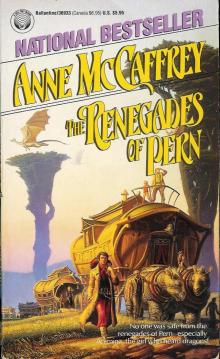 The Renegades of Pern (dragon riders of pern)
The Renegades of Pern (dragon riders of pern)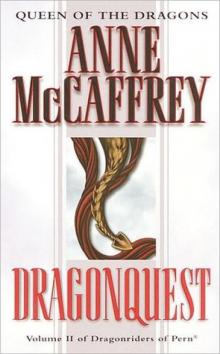 Dragonquest
Dragonquest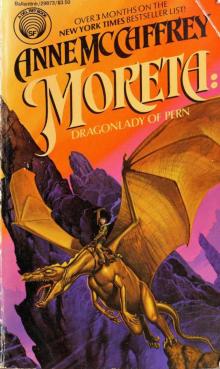 Moreta (Dragonlady of Pern)
Moreta (Dragonlady of Pern)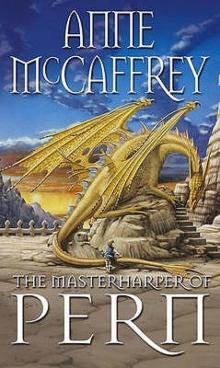 The Masterharper of Pern
The Masterharper of Pern If Wishes Were Horses
If Wishes Were Horses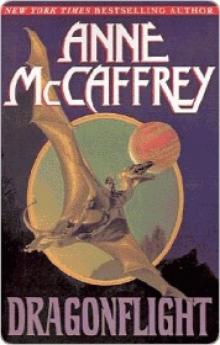 Dragonflight
Dragonflight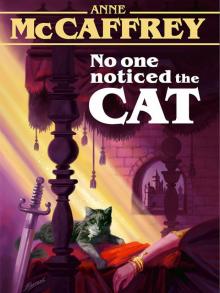 No One Noticed the Cat
No One Noticed the Cat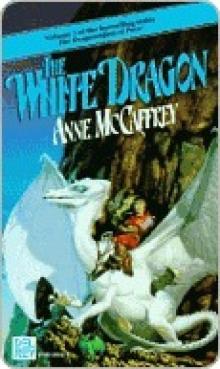 The White Dragon
The White Dragon A Gift of Dragons
A Gift of Dragons Harper Hall - Dragonsong
Harper Hall - Dragonsong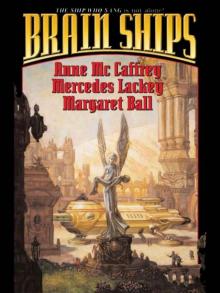 Brain Ships
Brain Ships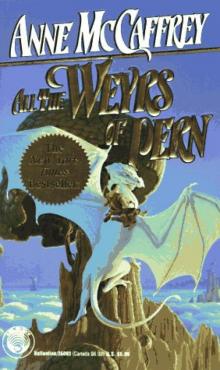 All The Weyrs of Pern
All The Weyrs of Pern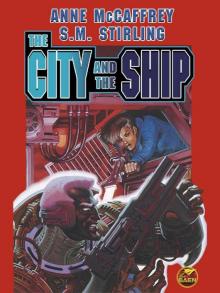 The City and the Ship
The City and the Ship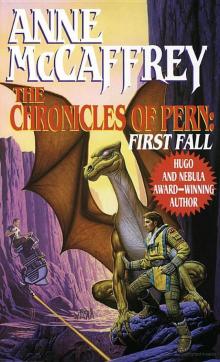 The Chronicles of Pern: First Fall
The Chronicles of Pern: First Fall Acorna’s Search
Acorna’s Search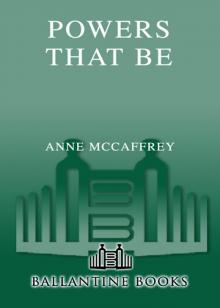 Powers That Be
Powers That Be Second Wave
Second Wave Chronicles of Pern (First Fall)
Chronicles of Pern (First Fall) The Kilternan Legacy
The Kilternan Legacy Decision at Doona
Decision at Doona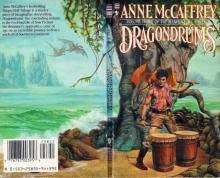 Dragondrums (dragon riders of pern)
Dragondrums (dragon riders of pern)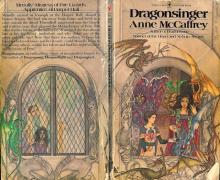 Dragonsinger (dragon riders of pern)
Dragonsinger (dragon riders of pern)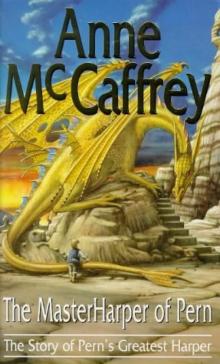 The Master Harper of Pern
The Master Harper of Pern Crystal Singer
Crystal Singer Acorna’s People
Acorna’s People Pegasus in Flight
Pegasus in Flight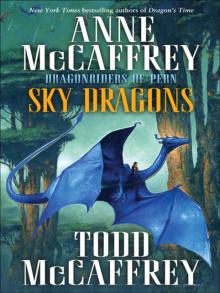 Sky Dragons Dragonriders of Pern
Sky Dragons Dragonriders of Pern Dragonriders of Pern 4 - Dragonsinger
Dragonriders of Pern 4 - Dragonsinger Treaty at Doona
Treaty at Doona Damia's Children
Damia's Children Stitch In Snow
Stitch In Snow The Rowan
The Rowan Dinosaur Planet
Dinosaur Planet The Year of the Lucy
The Year of the Lucy The White Dragon p-4
The White Dragon p-4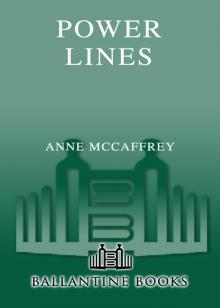 Power Lines
Power Lines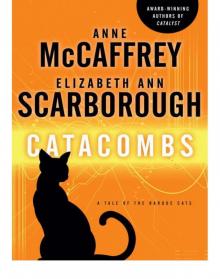 Catacombs
Catacombs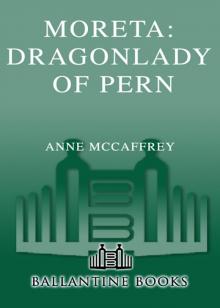 Moreta
Moreta Dragonsinger
Dragonsinger Crystal Line
Crystal Line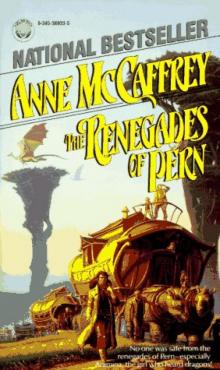 The Renegades of Pern
The Renegades of Pern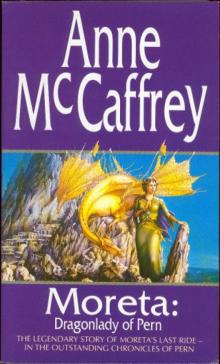 Moreta - Dragonlady of Pern p-8
Moreta - Dragonlady of Pern p-8 Deluge
Deluge The Skies of Pern
The Skies of Pern Acorna's Quest
Acorna's Quest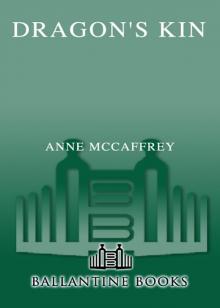 Dragon's Kin
Dragon's Kin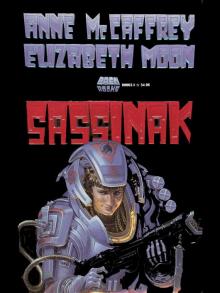 Sassinak
Sassinak![Crystal Universe - [Crystal Singer 03] - Crystal Line Read online](http://i1.bookreadfree.com/i1/03/31/crystal_universe_-_crystal_singer_03_-_crystal_line_preview.jpg) Crystal Universe - [Crystal Singer 03] - Crystal Line
Crystal Universe - [Crystal Singer 03] - Crystal Line Freedom's Landing
Freedom's Landing Acorna’s Quest
Acorna’s Quest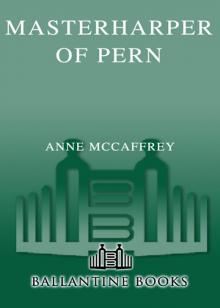 Masterharper of Pern
Masterharper of Pern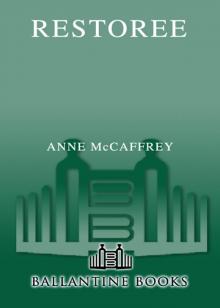 Restoree
Restoree Dolphins of Pern
Dolphins of Pern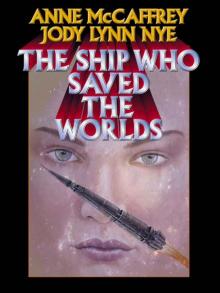 The Ship Who Saved the Worlds
The Ship Who Saved the Worlds Acorna's Triumph
Acorna's Triumph Acorna's Rebels
Acorna's Rebels![[Acorna 08] - First Warning: Acorna's Children (with Elizabeth Ann Scarborough) Read online](http://i1.bookreadfree.com/i1/04/06/acorna_08_-_first_warning_acornas_children_with_elizabeth_ann_scarborough_preview.jpg) [Acorna 08] - First Warning: Acorna's Children (with Elizabeth Ann Scarborough)
[Acorna 08] - First Warning: Acorna's Children (with Elizabeth Ann Scarborough) Dragonsong (dragon riders of pern)
Dragonsong (dragon riders of pern) Dragonriders of Pern 6 - Dragondrums
Dragonriders of Pern 6 - Dragondrums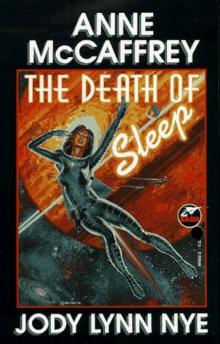 The Death of Sleep
The Death of Sleep Crisis On Doona
Crisis On Doona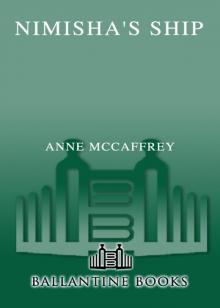 Nimisha's Ship
Nimisha's Ship Black Horses for the King
Black Horses for the King Changelings
Changelings Freedom's Choice
Freedom's Choice The Lady
The Lady The Coelura
The Coelura Catalyst
Catalyst The Unicorn Girl
The Unicorn Girl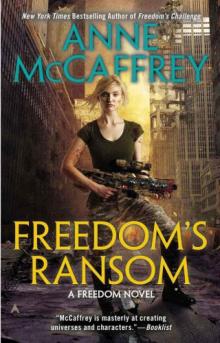 Freedom's Ransom
Freedom's Ransom Nerilka's Story
Nerilka's Story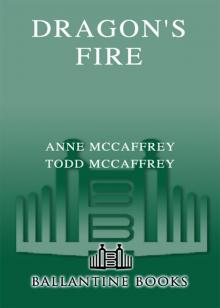 Dragon's Fire
Dragon's Fire Generation Warriors
Generation Warriors Lyon's Pride
Lyon's Pride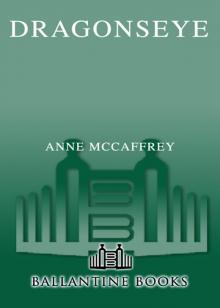 Dragonseye
Dragonseye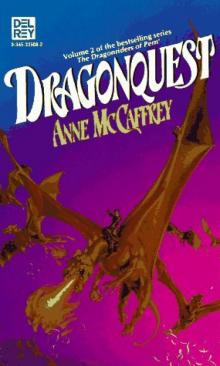 Dragon Quest
Dragon Quest Dragondrums
Dragondrums Dragonsong
Dragonsong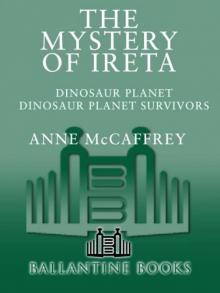 The Mystery of Ireta
The Mystery of Ireta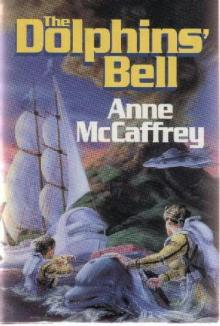 Dolphins' Bell
Dolphins' Bell To Ride Pegasus
To Ride Pegasus Power Play
Power Play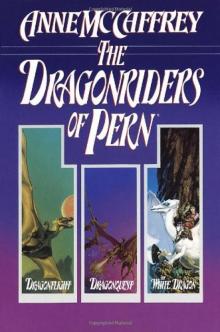 The Dragonriders of Pern
The Dragonriders of Pern An Exchange of Gifts
An Exchange of Gifts The Ship Who Sang
The Ship Who Sang Sky Dragons: Dragonriders of Pern
Sky Dragons: Dragonriders of Pern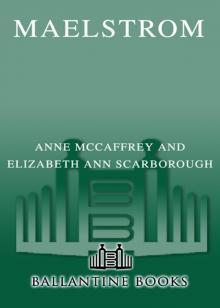 Maelstrom
Maelstrom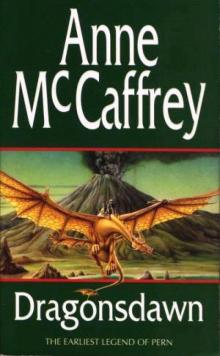 Dragons Dawn
Dragons Dawn Dragon Song
Dragon Song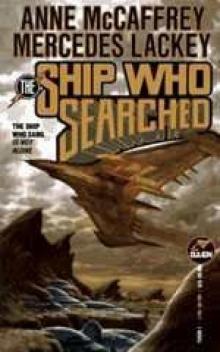 The Ship Who Searched b-3
The Ship Who Searched b-3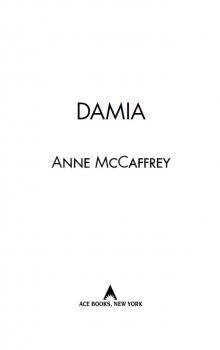 Damia
Damia Freedom's Challenge
Freedom's Challenge